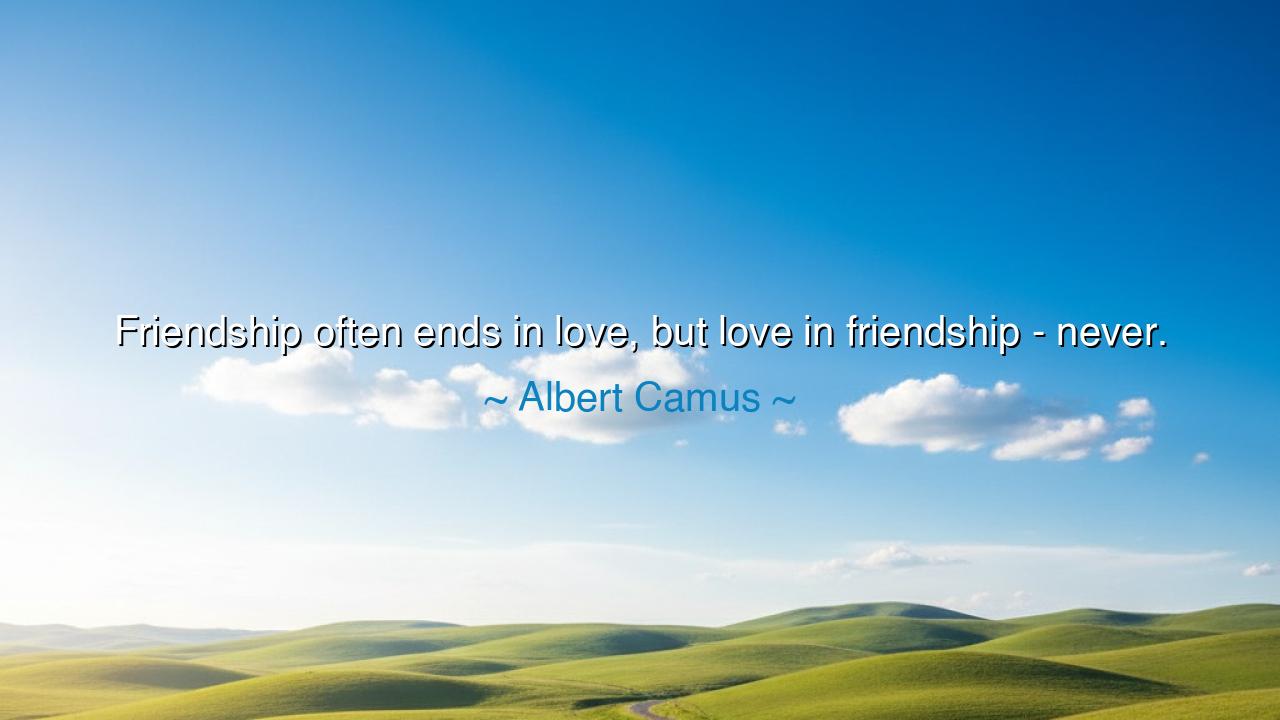
Friendship often ends in love, but love in friendship - never.






"Friendship often ends in love, but love in friendship — never." So wrote Albert Camus, the philosopher of silence and sunlight, who searched for meaning amid the ruins of human desire. In this single line, he reveals one of the most poignant truths of the heart: that while friendship can gently blossom into love, love, once it burns and breaks, rarely descends again to friendship. The path from affection to passion is smooth and alluring, but the return is steep and strewn with ashes. What is born of calm understanding may rise into fire, yet what has burned cannot easily cool again into serenity.
In the beginning, friendship is a quiet river — flowing steady, pure, and undemanding. Two souls meet and learn one another without masks, without the fever of possession. Trust deepens, laughter flows easily, and the heart, feeling safe, begins to open its secret chambers. From such still waters, love may emerge, not as a sudden storm but as a sunrise — soft, inevitable, and transformative. Camus saw this as natural, for friendship already contains the seed of love: loyalty, admiration, and the quiet wish for the other’s happiness. When this seed is warmed by intimacy and time, it blooms into something radiant — love itself.
But when love is the beginning, the story is different. Love, in its purest form, is a consuming flame. It is beautiful, but it burns. It demands, it aches, it trembles between joy and despair. And when it dies, it does not leave the ground unscarred. Those who once loved may speak of friendship afterward, but often it is only a shadow of what once was. The very closeness that made love so vivid becomes a wound too tender to touch. The heart cannot forget the fire; the memory of passion makes the calm of friendship impossible. This is what Camus meant — that love, in ending, does not descend gently; it collapses, and its ruins cannot host the gentleness it once transcended.
History is full of such tragic lessons. Consider the tale of Héloïse and Abelard, the scholar and his student, whose love defied both law and faith. When their secret passion was discovered, they were torn apart by violence and vow — he to the monastery, she to the convent. Their letters, written across years of separation, are filled with longing and sorrow. Abelard spoke of friendship, of reason and peace, but Héloïse replied, “You may call it friendship, but I feel only the remains of love.” Their story shows that though love can refine into memory and respect, it rarely returns to the tranquil equality of friendship. The heart remembers what the mind would forget.
And yet, there is a certain beauty in this truth. For if love cannot become friendship, it is because love is too vast, too consuming to be contained by the modest vessel of camaraderie. When two souls have shared the sacred fire, they are no longer as they were. Even if they part, even if they never speak again, the mark of that union remains — not as friendship, but as a quiet eternity, carried separately in both hearts. Love transforms; it does not retreat.
Camus, who lived through war and exile, understood that love and friendship mirror the dual nature of human existence — the need for connection and the inevitability of loss. Friendship is the harmony of reason; love, the rebellion of the soul. The one endures through understanding, the other burns through desire. It is no accident that friendship may become love — for love is the flowering of the human bond — but love rarely becomes friendship, because no flower, once it has withered, can return to the bud.
Lesson: Cherish friendship as the soil from which many good things grow. Let it deepen naturally, without haste or hunger. If love blossoms from it, accept it as a gift. But if love ends, grieve it — do not try to force it back into friendship, for that is to ask the heart to forget its own fire.
Practical action: Nurture your friendships with patience and honesty. Do not rush to transform them into love, for friendship itself is sacred. If you fall in love with a friend, be brave, and if love fades, honor what was shared without pretending it can return unchanged. Let time and silence do their healing work. For in the rhythm of life, both friendship and love are divine — one steady as the earth, the other blazing as the sun — and to know both, in their truth, is to know the full measure of the human heart.






AAdministratorAdministrator
Welcome, honored guests. Please leave a comment, we will respond soon